现在完成时和过去完成时语法精讲
高中英语语法--现在完成时和过去完成时的区别

语法----现在完成时和过去完成时的区别1.从结构上区别现在完成时:主语 + have / has + 过去分词(肯定式)主语 + have / has + not + 过去分词(否定式)Have / Has + 主语 + 过去分词(疑问式)过去完成时:主语 + had + 过去分词(肯定式)主语 +had + not + 过去分词(否定式)Had + 主语 + 过去分词(疑问式)2.从时间状语区别现在完成时: 常用的时间状语包括“now, today, tonight, this week, this year, already, yet, just, recently…etc”。
过去完成时: 常用的时间状语包括“by, at, before等构成的短语”。
注意:当表示一段时间,现在完成时和过去完成时都可以用for 或since引导的状语。
例如:Have you had your lunch yet? 你吃午饭了吗?Yes, I have . I’ve just had it. 是的,我刚吃完。
I have had a clock now. 我现在有一个闹钟了。
Have you already posted the photos? 你把照片寄走了吗?The meeting had begun when we got there. 我们到那儿时,会议已经开始了。
We had learned about 5000English words by the end of last term.到上学期末我们已经学了5000个英语单词。
They had done the work at five o’clock. 在五点钟的时候他们已经完成了那项工作。
I’ve known Li Lei for three years. 我认识李蕾已经三年了。
I have worked here since ten years ago. 自从十年前我就在这工作。
语法:6-7现在完成时、过去完成时
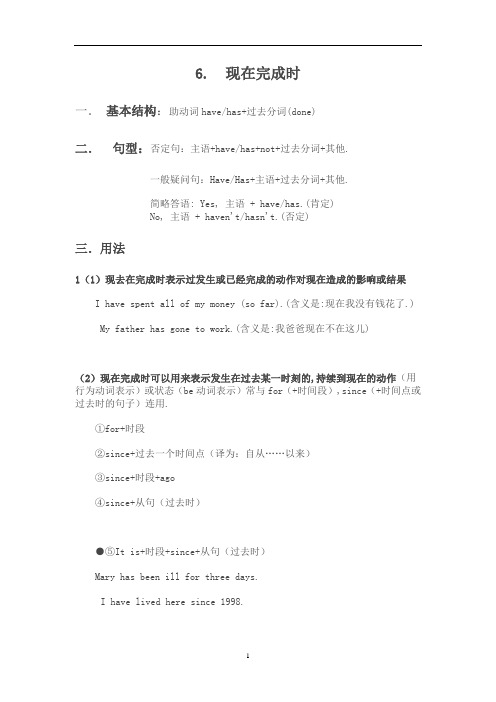
6. 现在完成时一.基本结构:助动词have/has+过去分词(done)二.句型:否定句:主语+have/has+not+过去分词+其他.一般疑问句:Have/Has+主语+过去分词+其他.简略答语: Yes, 主语 + have/has.(肯定)No, 主语 + haven't/hasn't.(否定)三.用法1(1)现去在完成时表示过发生或已经完成的动作对现在造成的影响或结果I have spent all of my money (so far).(含义是:现在我没有钱花了.)My father has gone to work.(含义是:我爸爸现在不在这儿)(2)现在完成时可以用来表示发生在过去某一时刻的,持续到现在的动作(用行为动词表示)或状态(be动词表示)常与for(+时间段),since(+时间点或过去时的句子)连用.①for+时段②since+过去一个时间点(译为:自从……以来)③since+时段+ago④since+从句(过去时)●⑤It is+时段+since+从句(过去时)Mary has been ill for three days.I have lived here since 1998.四.has gone (to),has been (to), has been (in) 的区别Have/Has gone(to) : 去了(现在不在说话现场) 例如:例如: Where is your father?He has gone to Shanghai.Have/Has been (to) :去过(已不在去过的地方)My father has been to Shanghai.Have/has been in:呆了多久(还在所呆的地方)My father has been in Shanghai for two months. /since two months ago.五.现在完成时的标志1. 现在完成时的含义之一是过去完成的动作对现在仍有影响,用以下四大标志词可以表达这种含义:* 以already, just和yet为标志He has already got her help. 他已得到她的帮助。
现在完成时与过去完成时

现在完成时与过去完成时现在完成时和过去完成时都是英语中的时态形式,用于描述动作或事件发生的时间。
虽然两者都表示过去发生的动作或事件,但它们的用法和概念稍有不同。
下面将逐一介绍现在完成时和过去完成时的用法及特点。
一、现在完成时 (Present Perfect)现在完成时用于描述过去发生的动作或事件对现在造成的影响或结果。
它的基本结构是“have/has + 过去分词”。
以下是现在完成时的几个主要用法:1. 表示过去发生的动作对现在造成的影响或结果:常与表示经验、常态或持续性的副词或时间状语连用,例如:already(已经)、yet (还)、never(从不)、ever(曾经)、so far(到目前为止)、recently(最近)、up to now(到目前为止)等。
例如:- I have already finished my homework.(我已经完成作业了。
)- Have you ever been to Paris?(你曾经去过巴黎吗?)2. 表示动作或事件发生时间不明确的情况下,强调的是结果或经验:常与表示程度或数量的副词连用,例如:just(刚刚)、already(已经)、never(从不)、ever(曾经)、yet(还)等。
例如:- I have just seen the movie.(我刚刚看过那部电影。
)- He has never traveled abroad.(他从未出过国。
)3. 表示过去开始的动作或事件一直延续到现在:常与表示时间段的状语连用,例如:for(表示时间段)、since(表示时间点)、howlong(多久)等。
例如:- They have lived in this city for five years.(他们在这座城市已经住了五年了。
)- I have known her since 2010.(我认识她自2010年起。
)二、过去完成时 (Past Perfect)过去完成时用于描述过去的某个时间点或之前发生的动作或事件。
现在完成时与过去完成时讲解

现在完成时1.现在完成时态表示过去发生的动作对现在造成的影响或结果。
本时态标志词:already (“已经”,用于肯定句中,放在have /has之后或句尾);yet (“仍然”“还”,用于疑问句或否定句的句尾)just(“刚刚”,放在have /has之后);before(“以前”,放在句尾);ever(“曾经”,放在have /has之后)never (“从没有”,在have /has之后)例句:teacher has just left.have studied English already.have not finished the homework yet.has never been to Beijing before.例:I have just turned off the light. 我刚刚把灯关上。
(结果是灯已经关上了)She has lost her bike. 她把自行车丢了。
(影响是他现在没有自行车骑了)The rain has stopped now. 雨已经停了。
(结果是我们可以出门了)I have already read the book. 我已读过这本书了。
(结果是已知道这本书的内容)She has had a good education. 她受到过良好的教育。
(影响是她文化水平高,有修养)2.某个动作从过去已经开始,一直持续到现在,还有可能持续到将来.(也可能不继续下去),常同包括现在在内的时间状语连用,如:today, now, this week, this morning, these days, this afternoon, recen tly, so far等动作的持续性要通过一段时间来表示一段时间的表达方法有两种:for: +一段时间 for a year for two weeks for three yearsSince +过去的某一时刻, since nine since last weekSince +一般过去时态的时间状语从句 since you came ; since you got hom e.例:We have had much snow this winter. 今年冬天多雪。
现在完成时和过去完成时的区别
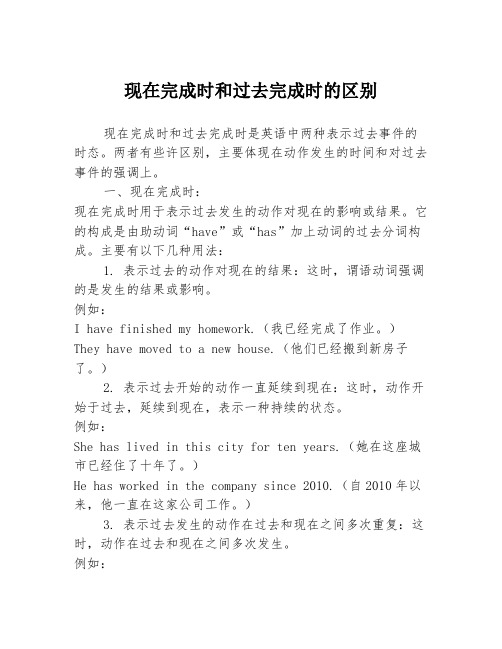
现在完成时和过去完成时的区别现在完成时和过去完成时是英语中两种表示过去事件的时态。
两者有些许区别,主要体现在动作发生的时间和对过去事件的强调上。
一、现在完成时:现在完成时用于表示过去发生的动作对现在的影响或结果。
它的构成是由助动词“have”或“has”加上动词的过去分词构成。
主要有以下几种用法:1. 表示过去的动作对现在的结果:这时,谓语动词强调的是发生的结果或影响。
例如:I have finished my homework.(我已经完成了作业。
)They have moved to a new house.(他们已经搬到新房子了。
)2. 表示过去开始的动作一直延续到现在:这时,动作开始于过去,延续到现在,表示一种持续的状态。
例如:She has lived in this city for ten years.(她在这座城市已经住了十年了。
)He has worked in the company since 2010.(自2010年以来,他一直在这家公司工作。
)3. 表示过去发生的动作在过去和现在之间多次重复:这时,动作在过去和现在之间多次发生。
例如:They have visited Japan three times.(他们已经去过日本三次了。
)I have read this book twice.(我已经读过这本书两次了。
)4. 表示过去经历或完成的动作对现在的补充说明:这时,过去发生的动作为现在提供了相关信息。
例如:I have studied English for five years.(我学英语已经有五年了。
)She has been on vacation for two weeks.(她已经度假两周了。
)二、过去完成时:过去完成时用于表示过去的动作在另一个过去事件之前发生。
它的构成是由“had”加上动词的过去分词。
主要有以下几种用法:1. 表示过去发生的动作在另一个过去事件之前完成:这时,过去完成时强调在过去某个时间之前就已经完成的动作。
九年级中考英语语法知识梳理--现在完成时 过去完成时

九年级中考英语语法知识梳理现在完成时+过去完成时现在完成时现在完成时表示到目前为止已经完成的动作或存在的状态。
现在完成时是一种发生于过去、着眼于现在的时态;动作发生在过去,而强调点落在对现在的影响上,或描述从过去一直持续到现在的动作或状态。
1.现在完成时谓语动词的结构形式(1)现在完成时谓语动词的结构形式:助动词have/has+过去分词。
has用于主语为第三人称单数的句子中,其他各人称用have。
如:I have lived in Wuhan for years.我在武汉生活了好几年了。
She has finished her homework already.她已经完成作业了。
(2)现在完成时一般疑问句、否定句、特殊疑问句结构及一般疑问句的答语:■一般疑问句为:将have/has 放在句子开头,且首字母要大写,句末用问号。
■肯定回答为:Yes,+主语的相应代词+have或has;■否定回答为:No,+主语的相应代词+haven't或hasn't;■否定句为:在have,has后加not+过去分词。
have和has可以和not缩写为haven't,hasn't。
■特殊疑问句为:特殊疑问词+have/has+主语+过去分词+……?如:— Have you read the article in today's newspaper?你看过今天报纸上的文章了吗?(一般疑问句)— Yes,I have.是的,我看过。
/No,I haven't.不,我没看过。
(肯定、否定回答)— Has your mother finished cooking?你妈妈做完饭了吗?(一般疑问句)— Yes,she has.是的,她做完了。
/No,she hasn't.不,她没有。
(肯定、否定回答)They haven't written to their parents.他们还没有给父母写信。
现在完成时与过去完成时的综合运用
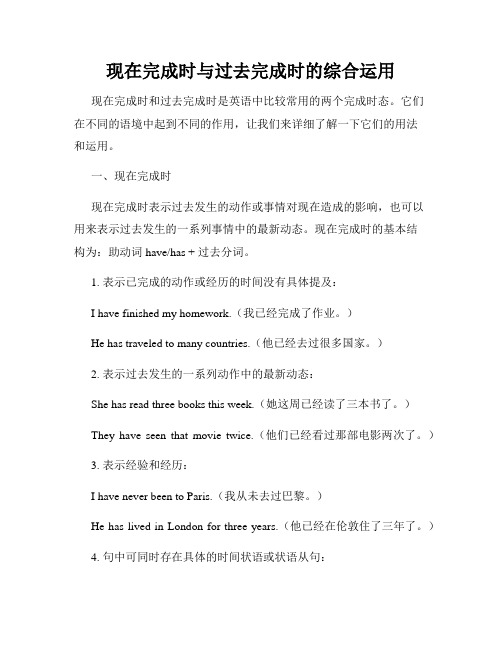
现在完成时与过去完成时的综合运用现在完成时和过去完成时是英语中比较常用的两个完成时态。
它们在不同的语境中起到不同的作用,让我们来详细了解一下它们的用法和运用。
一、现在完成时现在完成时表示过去发生的动作或事情对现在造成的影响,也可以用来表示过去发生的一系列事情中的最新动态。
现在完成时的基本结构为:助动词have/has + 过去分词。
1. 表示已完成的动作或经历的时间没有具体提及:I have finished my homework.(我已经完成了作业。
)He has traveled to many countries.(他已经去过很多国家。
)2. 表示过去发生的一系列动作中的最新动态:She has read three books this week.(她这周已经读了三本书了。
)They have seen that movie twice.(他们已经看过那部电影两次了。
)3. 表示经验和经历:I have never been to Paris.(我从未去过巴黎。
)He has lived in London for three years.(他已经在伦敦住了三年了。
)4. 句中可同时存在具体的时间状语或状语从句:We have visited the museum this morning.(我们今天上午参观了博物馆。
)She has already left when I arrived.(当我到达时,她已经离开了。
)二、过去完成时过去完成时表示过去某个时间点之前已经完成的动作或事情。
过去完成时的基本结构为:had + 过去分词。
1. 表示在过去某个时间点之前已经完成的动作:I had finished my homework when my friend came over.(当我的朋友过来时,我已经完成了作业。
)They had left the office before the boss arrived.(老板到达之前,他们已经离开了办公室。
现在完成时与过去完成时讲解

与过去完成进行时的区别
过去完成时强调动作发生在过去的过去
过去完成进行时可以表示动作的未完成性
过去完成进行时可以表示动作的重复
过去完成进行时强调动作的持续性和正在进行
常见错误及注意事项
混淆现在完成时与过去完成时
忽略时间状语
与过去时混淆
忽略过去完成时的用法
忽略否定形式:现在完成时的否定形式需要在助动词have/has后加上not。
03
过去完成时
定义与结构
定义:过去完成时表示在过去某个时间或动作之前已经完成的动作或状态
结构:过去完成时由助动词had+过去分词构成,其中had是助动词have的过去式
时间状语:过去完成时常与“by+过去的时间状语”连用,表示在过去的某个时间之前已经完成的动作或状态
结构:have/has + 过去分词。
用法与意义
过去发生的动作对现在造成的影响
过去动作持续到现在,并可能继续下去
表达感情、状态、能力等
用于时间状语从句中
与一般过去时的区别
语境:现在完成时更常用于描述现在的状态、结果或影响,与现在的生活、工作、学习等密切相关;一般过去时则更常用于描述过去的具体事件、经历等。
表达方式:现在完成时通常用“have/has+过去分词”的形式表达;一般过去时则用“动词过去式”表达。
常见错误及注意事项
忽略时间状语:现在完成时需要使用表示现在或过去时间的状语,如"已经"、"刚刚"等。
混淆时态:现在完成时与一般过去时容易混淆,要注意区分。
忽略助动词have/has:现在完成时需要使用助动词have/has,不能省略。
过去完成时和现在完成时的区别是什么?
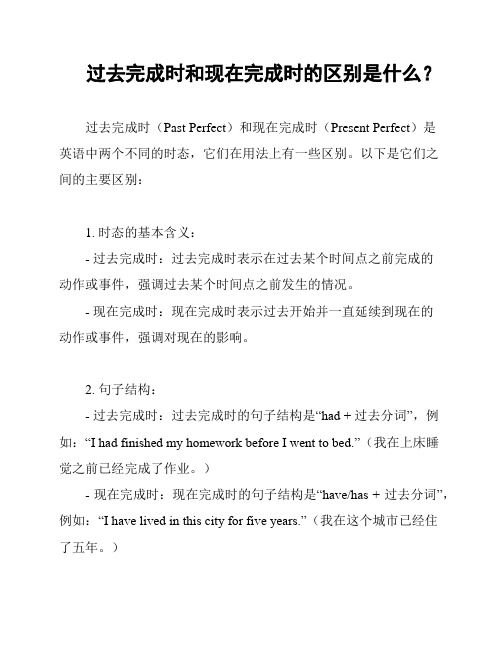
过去完成时和现在完成时的区别是什么?过去完成时(Past Perfect)和现在完成时(Present Perfect)是英语中两个不同的时态,它们在用法上有一些区别。
以下是它们之间的主要区别:1. 时态的基本含义:- 过去完成时:过去完成时表示在过去某个时间点之前完成的动作或事件,强调过去某个时间点之前发生的情况。
- 现在完成时:现在完成时表示过去开始并一直延续到现在的动作或事件,强调对现在的影响。
2. 句子结构:- 过去完成时:过去完成时的句子结构是“had + 过去分词”,例如:“I had finished my homework before I went to bed.”(我在上床睡觉之前已经完成了作业。
)- 现在完成时:现在完成时的句子结构是“have/has + 过去分词”,例如:“I have lived in this city for five years.”(我在这个城市已经住了五年。
)3. 时态转换:- 过去完成时可以用于转述过去的时间和事件,变为间接引语时不需要改变时态。
- 直接引语:She said, "I had already eaten when she arrived."(她说:“她到的时候我已经吃过饭了。
”)- 间接引语:She said that she had already eaten when she arrived.(她说她到的时候已经吃过饭了。
)- 现在完成时需要根据转述时的时间进行时态转换。
- 直接引语:He said, "I have finished my work today."(他说:“我今天已经完成了我的工作。
”)- 间接引语:He said that he had finished his work that day.(他说他那天已经完成了工作。
)4. 时间表达:- 过去完成时通常和表示过去某个时间的副词或短语连用,如:before(在...之前)、by the time(到...的时候)、already(已经)等。
现在完成时和过去完成时的区别
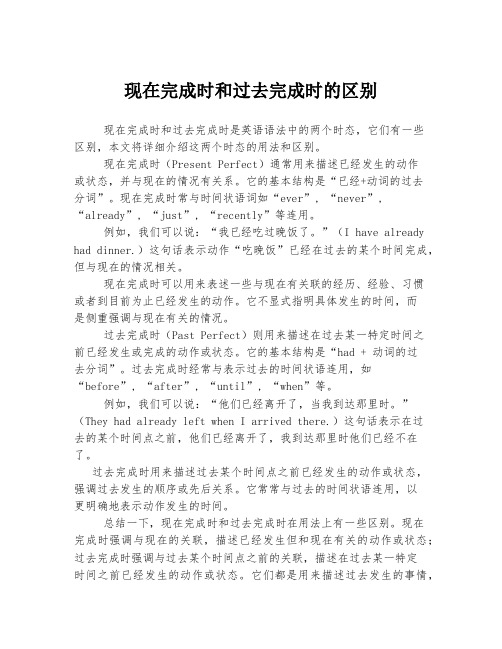
现在完成时和过去完成时的区别现在完成时和过去完成时是英语语法中的两个时态,它们有一些区别,本文将详细介绍这两个时态的用法和区别。
现在完成时(Present Perfect)通常用来描述已经发生的动作或状态,并与现在的情况有关系。
它的基本结构是“已经+动词的过去分词”。
现在完成时常与时间状语词如“ever”, “never”, “already”, “just”, “recently”等连用。
例如,我们可以说:“我已经吃过晚饭了。
”(I have already had dinner.)这句话表示动作“吃晚饭”已经在过去的某个时间完成,但与现在的情况相关。
现在完成时可以用来表述一些与现在有关联的经历、经验、习惯或者到目前为止已经发生的动作。
它不显式指明具体发生的时间,而是侧重强调与现在有关的情况。
过去完成时(Past Perfect)则用来描述在过去某一特定时间之前已经发生或完成的动作或状态。
它的基本结构是“had + 动词的过去分词”。
过去完成时经常与表示过去的时间状语连用,如“before”, “after”, “until”, “when”等。
例如,我们可以说:“他们已经离开了,当我到达那里时。
”(They had already left when I arrived there.)这句话表示在过去的某个时间点之前,他们已经离开了,我到达那里时他们已经不在了。
过去完成时用来描述过去某个时间点之前已经发生的动作或状态,强调过去发生的顺序或先后关系。
它常常与过去的时间状语连用,以更明确地表示动作发生的时间。
总结一下,现在完成时和过去完成时在用法上有一些区别。
现在完成时强调与现在的关联,描述已经发生但和现在有关的动作或状态;过去完成时强调与过去某个时间点之前的关联,描述在过去某一特定时间之前已经发生的动作或状态。
它们都是用来描述过去发生的事情,但关注点略有不同。
然而,需要注意的是,中文与英文的时态在表达上有一些差异,所以直接翻译的结果可能不够准确。
现在完成时和过去完成时语法精讲
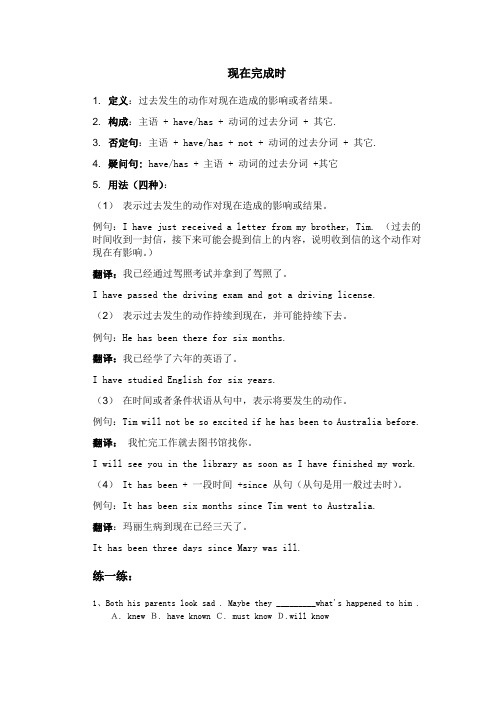
现在完成时1. 定义:过去发生的动作对现在造成的影响或者结果。
2. 构成:主语 + have/has + 动词的过去分词 + 其它.3. 否定句:主语 + have/has + not + 动词的过去分词 + 其它.4. 疑问句: have/has + 主语 + 动词的过去分词 +其它5. 用法(四种):(1)表示过去发生的动作对现在造成的影响或结果。
例句:I have just received a letter from my brother, Tim. (过去的时间收到一封信,接下来可能会提到信上的内容,说明收到信的这个动作对现在有影响。
)翻译:我已经通过驾照考试并拿到了驾照了。
I have passed the driving exam and got a driving license.(2)表示过去发生的动作持续到现在,并可能持续下去。
例句:He has been there for six months.翻译:我已经学了六年的英语了。
I have studied English for six years.(3)在时间或者条件状语从句中,表示将要发生的动作。
例句:Tim will not be so excited if he has been to Australia before.翻译:我忙完工作就去图书馆找你。
I will see you in the library as soon as I have finished my work.(4) It has been + 一段时间 +since 从句(从句是用一般过去时)。
例句:It has been six months since Tim went to Australia.翻译:玛丽生病到现在已经三天了。
It has been three days since Mary was ill.练一练:1、Both his parents look sad . Maybe they _________what's happened to him .A. knew B. have known C. must know D.will know2、I_______ a letter from him since he left.(天津市)A.didn't receive B.haven't got C.didn't have D.haven't heard3、—Where have you _______ these days?—I have_____ to Dazhu with my friends.A.been;gone B.been;been C.gone;been D.gone;gone4、Have you met Mr Li ______?A. just B. ago C.before D. a moment ago5、His father ______ the Party since 1978 .A. joined B. has joined C. was in D. has been in6、My parents ______ Shandong for ten years .A. have been in B. have been toC. have gone to D. have been6. 现在完成时的标志(1)以already, just,ever,never和yet为标志Already表示“已经”。
初中英语语法——现在完成时和过去完成时

初中英语语法——现在完成时和过去完成时现在完成时现在完成时主要表示过去的动作对现在造成的影响或从过去一直持续到现在的动作,包含已完成与未完成”两种意义。
其构成形式为主语have/has+过去分词”。
1. 现在完成时的构成eg: Though he has read the book three times, he hopes to read it again.尽管他已经把这本书读了三遍,他仍希望能再读一遍。
eg: I have not heard from my pare nts for a long time. 我很长时间没有收到父母的来信了。
eg: Have you travelled to another place?你去过别的地方旅行吗?2. 现在完成时的用法(1) 表示发生在过去的动作对现在仍有影响。
eg: He has tur ned off the light.eg: I have n ever see n such fine pictures before.eg: He has just gone to En gla nd.eg: Have you packed yet ?(2) 表从过去开始一直延续到现在(可能延续下去)的动作或状态。
eg: He has lived here since 1995.eg: I have been away from my hometown for thirty years. 我离开家乡有30 年了。
eg: Un cle Wang has worked in the factory since it ope ned.自从该工厂成立以来,王叔叔就一直在这里工作。
eg: 1 have lived in Bejing since I came to China.自从我来至U中国就一直住在北京。
(3) have gone to和have been to的区另have gone to表示去而未归” have been to表示去已归来”。
现在完成时与过去完成时讲解

现在完成时与过去完成时讲解现在完成时1.现在完成时态表示过去发生的动作对现在造成的影响或结果。
本时态标志词:already (“已经”,用于肯定句中,放在have /has之后或句尾);yet (“仍然”“还”,用于疑问句或否定句的句尾)just(“刚刚”,放在have /has之后);before(“以前”,放在句尾);ever(“曾经”,放在have /has之后)never (“从没有”,在have /has之后)例句:1.Our teacher has just left.2.We have studied English already.3.I have not finished the homework yet.4.He has never been to Beijing before.例:I have just turned off the light. 我刚刚把灯关上。
(结果是灯已经关上了)She has lost her bike.她把自行车丢了。
(影响是他现在没有自行车骑了)The rain has stopped now.雨已经停了。
(结果是我们可以出门了)I have already read the book.我已读过这本书了。
(结果是已知道这本书的内容)She has had a good education.她受到过良好的教育。
(影响是她文化水平高,有修养)2.某个动作从过去已经开始,一直持续到现在,还有可能持续到将来. (也可能不继续下去),常同包括现在在内的时间状语连用,如:today, now, this week, this morning, these days, this afternoon, recently, so far等动作的持续性要通过一段时间来表示一段时间的表达方法有两种:for: +一段时间for a year for two weeks for three yearsSince +过去的某一时刻, since nine since last weekSince +一般过去时态的时间状语从句since you came ; since you got home.例:We have had much snow this winter. 今年冬天多雪。
初中英语语法——现在完成时与过去完成时

现在完成时与过去完成时一、现在完成时过去发生并且已经完成的动作对现在造成影响或后果,过去某一时间开始并一直持续到现在的动作或状态。
1.构成现在完成时是由助动词have(has)+动词的过去分词构成。
助动词说明该谓语是属于现在时范围。
它和主语的人称、数要保持一致。
过去分词是主要的谓语动词,说明句子的意义。
2.用法(1)表示动作发生在过去某个不确定的时间,但对现在留下了某种影响和结果。
常被just、already、yet 等副词修饰。
如:-Have you had lunch yet? -Yes,I have. I've just had it. 你(已经)吃午饭了吗?我刚刚吃过。
(现在我不饿了)(2)表示从过去某一时刻开始一直持续到现在的动作或状态。
这个动作可能刚停止,可能仍然在进行。
常带有for和since等表示一段时间的状语。
如:He has taught here since 1981. 他自1981年就在这儿教书。
(可能还要继续教)I have't seen her for four years. 我有四年没见到她了。
(3)表示说话前发生过一次或多次的动作,现在成为一种经验,一般译为汉语“过”,常带有twice, ever, never, three times等时间状语。
如:I have been to Beijing twice.我去过北京二次。
3.结构1).陈述句结构:主语+have( has)(not)+过去分词+其它。
have not=haven’t has not=hasn’t.2).一般疑问句结构:Have( Has )+主语+过去分词+其它?3).特殊疑问句:特殊疑问词+have(has) +主语+ 过去分词+其它?eg. He has already finished his homework.He hasn’t finished his homework yet.Has he finished his homework yet?--Yes, he has./ No, he hasn’t./ No, not yet.4.现在完成时的时间状语(1)现在完成时属于现在时范围,故不能和过去的时间状语连用。
现在完成时和过去完成时的区别与应用
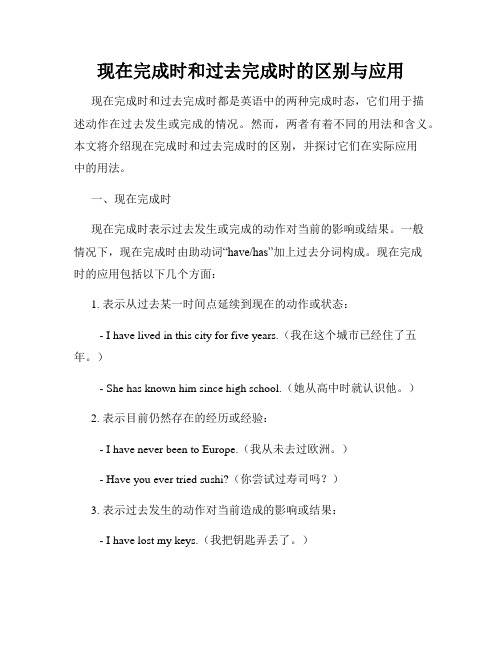
现在完成时和过去完成时的区别与应用现在完成时和过去完成时都是英语中的两种完成时态,它们用于描述动作在过去发生或完成的情况。
然而,两者有着不同的用法和含义。
本文将介绍现在完成时和过去完成时的区别,并探讨它们在实际应用中的用法。
一、现在完成时现在完成时表示过去发生或完成的动作对当前的影响或结果。
一般情况下,现在完成时由助动词“have/has”加上过去分词构成。
现在完成时的应用包括以下几个方面:1. 表示从过去某一时间点延续到现在的动作或状态:- I have lived in this city for five years.(我在这个城市已经住了五年。
)- She has known him since high school.(她从高中时就认识他。
)2. 表示目前仍然存在的经历或经验:- I have never been to Europe.(我从未去过欧洲。
)- Have you ever tried sushi?(你尝试过寿司吗?)3. 表示过去发生的动作对当前造成的影响或结果:- I have lost my keys.(我把钥匙弄丢了。
)- He has finished his homework, so he can play now.(他已经完成作业了,所以可以玩了。
)二、过去完成时过去完成时表示在过去某一时间点之前已经发生或完成的动作。
过去完成时由助动词“had”加上过去分词构成。
过去完成时的应用包括以下几个方面:1. 表示过去某一时间点之前已经完成的动作:- I had finished my work before he arrived.(在他到达之前,我已经完成了工作。
)- She had left the party when I arrived.(当我到达时,她已经离开了派对。
)2. 表示过去某一时间点之前已经具备的条件或经验:- They had studied English for many years before moving to the UK.(在搬到英国之前,他们已经学习了多年英语。
英语语法大攻克--现在完成时态和过去完成时态
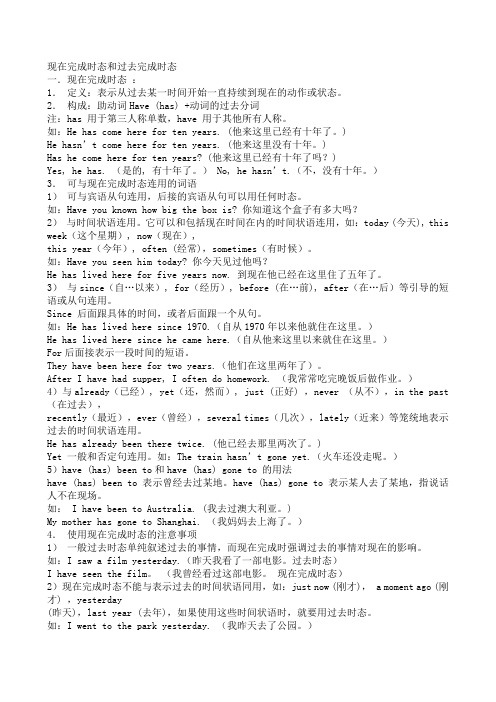
现在完成时态和过去完成时态一.现在完成时态:1.定义:表示从过去某一时间开始一直持续到现在的动作或状态。
2.构成:助动词Have (has) +动词的过去分词注:has 用于第三人称单数,have 用于其他所有人称。
如:He has come here for ten years. (他来这里已经有十年了。
)He hasn’t come here for ten years. (他来这里没有十年。
)Has he come here for ten years? (他来这里已经有十年了吗?)Yes, he has. (是的, 有十年了。
)No, he hasn’t.(不,没有十年。
)3.可与现在完成时态连用的词语1)可与宾语从句连用,后接的宾语从句可以用任何时态。
如:Have you known how big the box is? 你知道这个盒子有多大吗?2)与时间状语连用。
它可以和包括现在时间在内的时间状语连用,如:today (今天), this week(这个星期), now(现在),this year(今年), often (经常),sometimes(有时候)。
如:Have you seen him today? 你今天见过他吗?He has lived here for five years now. 到现在他已经在这里住了五年了。
3)与since(自…以来), for(经历), before (在…前), after(在…后)等引导的短语或从句连用。
Since 后面跟具体的时间,或者后面跟一个从句。
如:He has lived here since 1970.(自从1970年以来他就住在这里。
)He has lived here since he came here.(自从他来这里以来就住在这里。
)For后面接表示一段时间的短语。
They have been here for two years.(他们在这里两年了)。
初中英语语法——现在完成时和过去完成时

初中英语语法——现在完成时和过去完成时现在完成时现在完成时主要表示过去的动作对现在造成的影响或从过去一直持续到现在的动作,包含“已完成”与“未完成”两种意义。
其构成形式为“主语have/has+过去分词”。
1.现在完成时的构成eg: Though he has read the book three times, he hopes to read it again.尽管他已经把这本书读了三遍,他仍希望能再读一遍。
eg: I have not heard from my parents for a long time. 我很长时间没有收到父母的来信了。
eg: Have you travelled to another place? 你去过别的地方旅行吗?2.现在完成时的用法(1)表示发生在过去的动作对现在仍有影响。
eg: He has turned off the light.eg: I have never seen such fine pictures before.eg: He has just gone to England.eg: Have you packed yet ?(2)表从过去开始一直延续到现在(可能延续下去)的动作或状态。
eg: He has lived here since 1995.eg: I have been away from my hometown for thirty years. 我离开家乡有30年了。
eg: Uncle Wang has worked in the factory since it opened.自从该工厂成立以来,王叔叔就一直在这里工作。
eg: 1 have lived in Bejing since I came to China. 自从我来到中国就一直住在北京。
(3) have gone to 和have been to 的区别have gone to 表示“去而未归”; have been to 表示“去已归来”。
英语语法:现在完成时和过去完成时概述
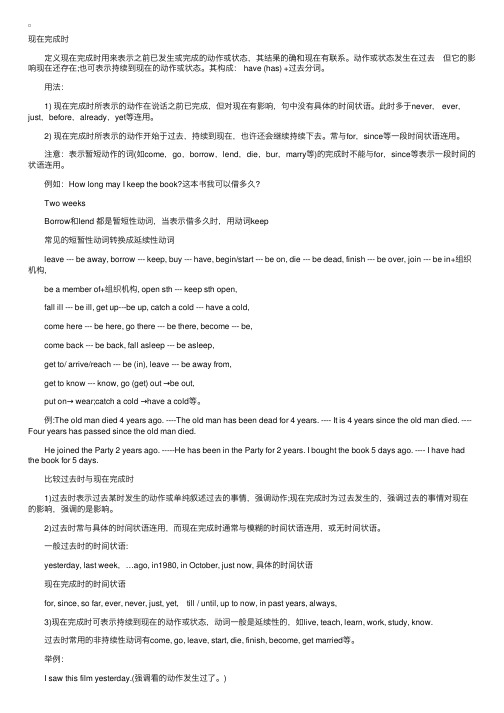
现在完成时 定义现在完成时⽤来表⽰之前已发⽣或完成的动作或状态,其结果的确和现在有联系。
动作或状态发⽣在过去 但它的影响现在还存在;也可表⽰持续到现在的动作或状态。
其构成: have (has) +过去分词。
⽤法: 1) 现在完成时所表⽰的动作在说话之前已完成,但对现在有影响,句中没有具体的时间状语。
此时多于never, ever,just,before,already,yet等连⽤。
2) 现在完成时所表⽰的动作开始于过去,持续到现在,也许还会继续持续下去。
常与for,since等⼀段时间状语连⽤。
注意:表⽰暂短动作的词(如come,go,borrow,lend,die,bur,marry等)的完成时不能与for,since等表⽰⼀段时间的状语连⽤。
例如:How long may I keep the book?这本书我可以借多久? Two weeks Borrow和lend 都是暂短性动词,当表⽰借多久时,⽤动词keep 常见的短暂性动词转换成延续性动词 leave --- be away, borrow --- keep, buy --- have, begin/start --- be on, die --- be dead, finish --- be over, join --- be in+组织机构, be a member of+组织机构, open sth --- keep sth open, fall ill --- be ill, get up---be up, catch a cold --- have a cold, come here --- be here, go there --- be there, become --- be, come back --- be back, fall asleep --- be asleep, get to/ arrive/reach --- be (in), leave --- be away from, get to know --- know, go (get) out →be out, put on→ wear;catch a cold →have a cold等。
现在完成时和过去完成时的区别
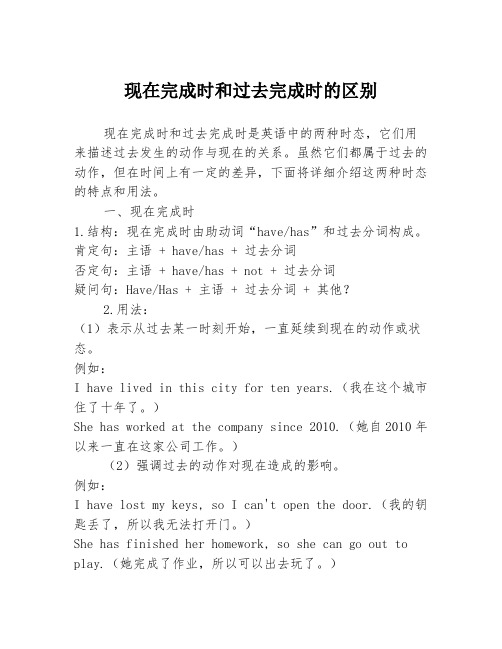
现在完成时和过去完成时的区别现在完成时和过去完成时是英语中的两种时态,它们用来描述过去发生的动作与现在的关系。
虽然它们都属于过去的动作,但在时间上有一定的差异,下面将详细介绍这两种时态的特点和用法。
一、现在完成时1.结构:现在完成时由助动词“have/has”和过去分词构成。
肯定句:主语 + have/has + 过去分词否定句:主语 + have/has + not + 过去分词疑问句:Have/Has + 主语 + 过去分词 + 其他?2.用法:(1)表示从过去某一时刻开始,一直延续到现在的动作或状态。
例如:I have lived in this city for ten years.(我在这个城市住了十年了。
)She has worked at the company since 2010.(她自2010年以来一直在这家公司工作。
)(2)强调过去的动作对现在造成的影响。
例如:I have lost my keys, so I can't open the door.(我的钥匙丢了,所以我无法打开门。
)She has finished her homework, so she can go out to play.(她完成了作业,所以可以出去玩了。
)(3)表示过去经历或经验。
例如:Have you ever been to Paris?(你去过巴黎吗?)He has never tried sushi before.(他以前从未尝试过寿司。
)3.信号词:already(已经)、yet(还)、just(刚刚)、ever(曾经)、never(从不)、recently(最近)等。
二、过去完成时1.结构:过去完成时由助动词“had”和过去分词构成。
肯定句:主语 + had + 过去分词否定句:主语 + had + not + 过去分词疑问句:Had + 主语 + 过去分词 + 其他?2.用法:(1)表示在过去某一时间点发生的动作或状态,在另一个过去时间点之前已经完成。
(完整)语法--现在完成时和过去完成时地区别

语法—-——现在完成时和过去完成时的区别1.从结构上区别现在完成时:主语 + have / has + 过去分词(肯定式)主语 + have / has + not + 过去分词 (否定式)Have / Has + 主语 + 过去分词(疑问式)过去完成时:主语 + had + 过去分词(肯定式)主语 +had + not + 过去分词(否定式)Had + 主语 + 过去分词(疑问式)2。
从时间状语区别现在完成时:常用的时间状语包括“now, today, tonight, this week, this year, already, yet, just, recently…etc”。
过去完成时:常用的时间状语包括“by, at, before等构成的短语"。
注意:当表示一段时间,现在完成时和过去完成时都可以用for 或since引导的状语.例如:Have you had your lunch yet?你吃午饭了吗?Yes, I have . I've just had it。
是的,我刚吃完.I have had a clock now。
我现在有一个闹钟了。
Have you already posted the photos? 你把照片寄走了吗?The meeting had begun when we got there。
我们到那儿时,会议已经开始了。
We had learned about 5000English words by the end of last term。
到上学期末我们已经学了5000个英语单词。
They had done the work at five o’clock. 在五点钟的时候他们已经完成了那项工作。
I’ve known Li Lei for three years。
我认识李蕾已经三年了。
I have worked here since ten years ago。
- 1、下载文档前请自行甄别文档内容的完整性,平台不提供额外的编辑、内容补充、找答案等附加服务。
- 2、"仅部分预览"的文档,不可在线预览部分如存在完整性等问题,可反馈申请退款(可完整预览的文档不适用该条件!)。
- 3、如文档侵犯您的权益,请联系客服反馈,我们会尽快为您处理(人工客服工作时间:9:00-18:30)。
现在完成时1. 定义:过去发生的动作对现在造成的影响或者结果。
2. 构成:主语+ have/has + 动词的过去分词+ 其它.3. 否定句:主语+ have/has + not + 动词的过去分词+ 其它.4. 疑问句: have/has + 主语+ 动词的过去分词+其它5. 用法(四种):(1)表示过去发生的动作对现在造成的影响或结果。
例句:I have just received a letter from my brother, Tim. (过去的时间收到一封信,接下来可能会提到信上的内容,说明收到信的这个动作对现在有影响。
)翻译:我已经通过驾照考试并拿到了驾照了。
I have passed the driving exam and got a driving license.(2)表示过去发生的动作持续到现在,并可能持续下去。
例句:He has been there for six months.翻译:我已经学了六年的英语了。
I have studied English for six years.(3)在时间或者条件状语从句中,表示将要发生的动作。
例句:Tim will not be so excited if he has been to Australia before.翻译:我忙完工作就去图书馆找你。
I will see you in the library as soon as I have finished my work.(4)It has been + 一段时间+since 从句(从句是用一般过去时)。
例句:It has been six months since Tim went to Australia.翻译:玛丽生病到现在已经三天了。
It has been three days since Mary was ill.练一练:1、Both his parents look sad . Maybe they _________what's happened to him .A. knew B. have known C. must know D.will know2、I_______ a letter from him since he left.(天津市)A.didn't receive B.haven't got C.didn't have D.haven't heard 3、—Where have you _______ these days?—I have_____ to Dazhu with my friends.A.been;gone B.been;been C.gone;been D.gone;gone4、Have you met Mr Li ______?A. just B. ago C.before D. a moment ago5、His father ______ the Party since 1978 .A. joined B. has joined C. was in D. has been in6、My parents ______ Shandong for ten years .A. have been in B. have been toC. have gone to D. have been6. 现在完成时的标志(1)以already, just,ever,never和yet为标志Already表示“已经”。
用在陈述句中,放在have/has之后,有时也放在句末。
Already也可用语疑问句中,但通常放在句末, 表示希望得到肯定的回答或者表示诧异。
Just表示“刚刚”,通常放在have/has之后。
e.g. I have already/jus t finished my homework.Have you finished your homework yet?翻译:她已经找到了她的自行车。
She has already found her bike.她已经找到了她的自行车了?Has she found her bike yet?Ever, never, yet常用语否定句或疑问句中。
Ever用语疑问句中,表示“曾经”, 放在have/has之后。
e.g. Have you ever been to Australia?翻译:你唱过这首英文歌吗?Have you ever sung this English song? Never用语否定句中,意为“从不”,放在have/has后面。
e.g.I have never been to Beijing.e.g. I haven’t found my ruler yet. (yet用于否定句,译为“还”)Have you found your ruler yet?你已经找到尺子了吗?(可用于疑问句,译为“已经”)(2) 以for + 一段时间、in + 一段时间为标志e.g. Zhao Lan has already studied in this school for two years .The famous writer has written one new book in the past two years .(3)以动作发生的次数为标志例句:He says he has been to the USA three times. 他说他已经去过美国三次了。
(4)以so far(到目前为止)、before为标志例句:He has got to Beijing so far.I have never been to Australia before.练一练:1. —______ you ___ your homework yet ?—Yes . I _____ it a moment ago .A. Did ; do ; finished B. Have ; done ; finishedC. Have ; done ; have finished D. will ; do ; finish2、The famous writer _____ one new book in the past two years .A. is writing B.was writing C.wrote D.has written3、—Our country ______ a lot so far .—Yes . I hope it will be even ______ .A. has changed ; well B. changed ; goodC. has changed ; better D. changed ; better过去完成时的用法1. 定义:过去完成时主要用来指过去某一特定时间以前完成的动作,即“过去的过去”。
2. 构成:“had + 过去分词”。
常与过去完成时连用的标志性时间状语有:by 1999, by theend of last year, at the age of, before then, until(till) then, by then.3. 用法:(1) 过去某一时间或某一动作前已发生的动作或存在的状态e.g. Before he volunteered to direct the traffic, Tim had had lots of jobs.I had just finished half of the work by yesterday.Jane had left before I arrived.翻译:她来这个机构前已经学过一些英语。
She had learned some English before she came to the institute.(2) 过去某一时间的动作或状态持续到过去另一时间,还可能持续下去。
常与until,by, before, by the end of, for, since等引导的时间状语连用。
e.g. It was the fastest I’d seen him move since 1964. 那是自1964年以来我所看到过的他走得最快的一次。
It had been very windy for a few hours and it had rained for two days.By then he had learned English for 3 years.翻译:到那时为止,他对此仍一无所知。
Until then he had know nothing about it yet.(3) 表示未曾实现的愿望或打算。
hope, wish,want, mean, intend, attempt, think, except等表示“打算,计划,希望,试图,认为”等动词用过去完成时时,表示“本打算(本计划、本希望、本认为)······”,而事实并未做。
e.g. I had hoped to be back, but I didn’t catch the train.I had intended to come to the party, but I was busy.The boy had meant to come in but the teacher refused him.翻译:我本想帮你的,但是当时我太忙了。
I had meant to see you, but I was too busy at that moment.(4) 用于某些特殊的句式中1)It / That was the first/second ···that···结构中,that 后的从句用过去完成时。
e.g. It was the second time that she had found the tracks of the wild man.2)在“no sooner···than···”, “hardly/scarcely···when···”等句型中,主句常用过去完成时,从句则用一般过去时,no sooner或hardly、scarcely 置于句首主要部分倒装:e.g. I had hardly got home when the rain poured down. 我刚到家,大雨就倾盘而下。
